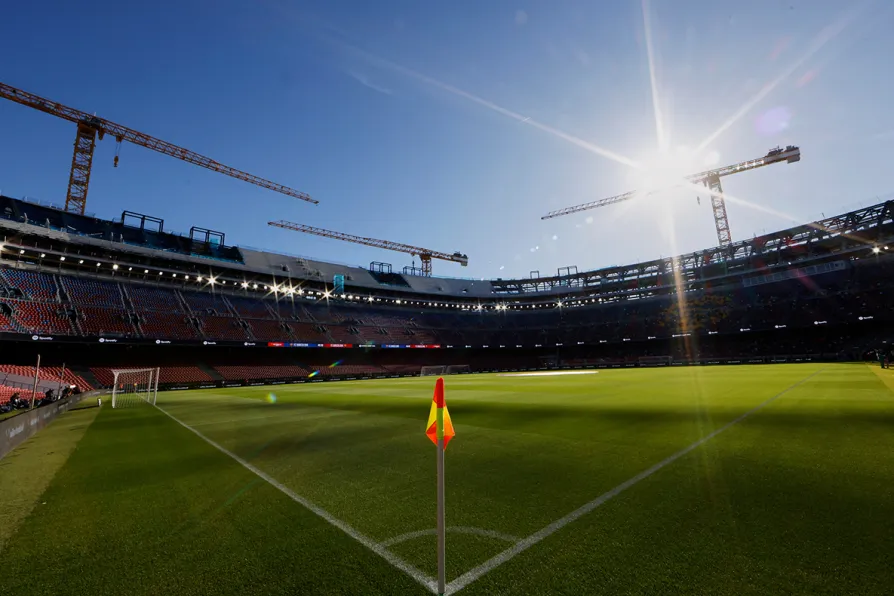As unions sound the alarm on kafala-like dependence, FC Barcelona must decide whether their values extend beyond the pitch, writes KIVANC ELIACIK

 A general view of the Camp Nou stadium in Barcelona, Spain, November 7, 2025
A general view of the Camp Nou stadium in Barcelona, Spain, November 7, 2025
ONE cool morning outside Barcelona’s Camp Nou, a crowd raised banners. No chants about transfers or trophies. Turkish construction workers and Catalan trade unionists were protesting over alleged labour abuses at Europe’s most visible construction site.
According to union complaints and workers’ testimonies, dozens of Turkish workers have been building FC Barcelona’s new stadium while standing on thin legal ice: expired residence papers, no valid work permits, crowded company housing and dismissals after they asked for their rights.
Limak, a Turkish construction giant, is the main contractor on the stadium rebuild, with a Lithuanian-registered, Turkish-owned employment agency among the subcontractors. Spain’s labour inspectorate has visited the site, identified irregularities and opened proceedings.
Workers are recruited in Turkey on Turkish pay scales and sent through Romania or Hungary. They are lodged in crowded flats. They work 50 to 60-hour weeks for pay below Spain’s prevailing rates. Some say they have been on site for six to 12 months; others say they were dismissed after joining Comisiones Obreras (CCOO), in co-ordination with the Progressive Trade Unions of Turkey (Disk) in Turkey.
One worker says he cannot visit his hospitalised daughter because he fears he would not be allowed back in with his visa. Dependency enforced through paperwork, housing tied to the job and the constant fear of losing legal status create a European echo of the Gulf’s kafala system.
Camp Nou is not just any building site. Opened in 1957 under Franco, it became a refuge for Catalan language and identity. In the 1970s, as Spain democratised, the motto “Mes que un club” (More than a club) took hold. The stands became a civic square as well as a theatre of sport, and seats passed down through generations.
It is also, unavoidably, a business. The Espai Barca programme is roughly a €1.5 billion project. To raise funds, the club sold VIP seats to Middle Eastern investors. The project has already fallen behind schedule, with the club citing permit issues, material delays and staff shortages. At its peak, Barca says, roughly 3,500 workers have been deployed across the project, though around 1,500 appear to be active on site at the moment. Limak secured the contract partly by promising fast delivery and a tight budget.
Modern football clubs try to protect their identity while struggling with financial survival. You cannot cover a construction fence with “More than a club” while the men behind it are less than a contract.
Blaming subcontractors is not enough. If Barca are sincere, they should publish the full oversight chain, reveal worker safety conditions and accept joint responsibility across all subcontractors.
This isn’t just a Barca story. For a decade, Europe’s skyline has been raised by racialised migrant labour. Behind the scenes, procurement pipelines and labour brokers turn borders into bottlenecks and workers into bargaining chips.
In the Gulf, kafala ties a worker’s legal status to a sponsor. In Barcelona, documents can expire, permits can lag and housing can be controlled by the employer. The set-up changes, but the dependence stays the same. When delays lead to penalties, the cost lands on the workers, usually the ones with the least power.
Football is rich in moral vocabulary: fair play, passion, teamwork. Its political economy is rich in euphemisms: optimisation, flexibility, outsourcing. Supply chains need a referee with a whistle and yellow and red cards. Did the club’s oversight play the man rather than the ball? Unions ask for basics: reinstate dismissed workers, pay wage arrears, register workers for social security from day one, and call on the state to fast-track residence and work permits for anyone who can prove six months’ labour on site. That is not radicalism. It is the rule of law.
Espai Barca sits where European investment, Middle Eastern money, local bureaucracy and global fandom meet. In this mix, accountability can easily disappear. If the club can sell VIP seats, they can set aside a small share to ensure decent working conditions. If a contractor wins a bid by promising speed and low costs, the contract should also enforce labour rights and transparency. And if the city calls the stadium a democratic symbol, it should make sure security guards do not remove union organisers from the pavement.
For Catalonia, there is a deeper irony. A ground that once allowed a people to speak their language under dictatorship now risks being rebuilt by men who are left speechless. For Europe, the lesson has long been ignored: kafala-like dependency does not need desert heat to grow. It spreads wherever time pressure, subcontracting and migrant insecurity meet.
Football matches are often decided in stoppage time; this is stoppage time for Camp Nou. Put labour clauses in the starting line-up of every public-facing contract, not on the bench. Now we will see whether European sport tolerates kafala-style labour, whether FC Barcelona, companies and the courts act, and whether trade unions from Spain and Turkey can be playmakers together.
Kivanc Eliacik is an author and trade unionist, and the director of International Relations at the Progressive Trade Unions of Turkey (Disk).

Report raises alarm over ‘preventable deaths’ of labourers in Saudi Arabia












